- Home
- Samuel Beckett
Krapp's Last Tape and Other Dramatic Pieces Page 2
Krapp's Last Tape and Other Dramatic Pieces Read online
Page 2
[Pause.]
Past midnight. Never knew—
[Krapp switches off, broods. Finally he fumbles in his pockets, encounters the banana, takes it out, peers at it, puts it back, fumbles, brings out envelope, fumbles, puts back envelope, looks at his watch, gets up and goes backstage into darkness. Ten seconds. Sound of bottle against glass, then brief siphon. Ten seconds. Bottle against glass alone. Ten seconds. He comes back a little unsteadily into light, goes to front of table, takes out keys, raises them to his eyes, chooses key, unlocks first drawer, peers into it, feels about inside, takes out reel, peers at it, locks drawer, puts keys back in his pocket, goes and sits down, takes reel off machine, lays it on dictionary, loads virgin reel on machine, takes envelope from his pocket, consults back of it, lays it on table, switches on, clears his throat and begins to record.]
KRAPP
Just been listening to that stupid bastard I took myself for thirty years ago, hard to believe I was ever as bad as that. Thank God that’s all done with anyway. [Pause.] The eyes she had! [Broods, realizes he is recording silence, switches off, broods. Finally.] Everything there, everything, all the—[Realizes this is not being recorded, switches on.] Everything there, everything on this old muckball, all the light and dark and famine and feasting of . . . [hesitates] . . . the ages! [In a shout.] Yes! [Pause.] Let that go! Jesus! Take his mind off his homework! Jesus! [Pause. Weary.] Ah well, maybe he was right. [Pause.] Maybe he was right. [Broods. Realizes. Switches off. Consults envelope.] Pah! [Crumples it and throws it away. Broods. Switches on.] Nothing to say, not a squeak. What’s a year now? The sour cud and the iron stool. [Pause.] Revelled in the word spool. [With relish.] Spooool! Happiest moment of the past half million. [Pause.] Seventeen copies sold, of which eleven at trade price to free circulating libraries beyond the seas. Getting known. [Pause.] One pound six and something, eight I have little doubt. [Pause.] Crawled out once or twice, before the summer was cold. Sat shivering in the park, drowned in dreams and burning to be gone. Not a soul. [Pause.] Last fancies. [Vehemently.] Keep ’em under! [Pause.] Scalded the eyes out of me reading Effie again, a page a day, with tears again. Effie. . . . [Pause.] Could have been happy with her, up there on the Baltic, and the pines, and the dunes. [Pause.] Could I? [Pause.] And she? [Pause.] Pah! [Pause.] Fanny came in a couple of times. Bony old ghost of a whore. Couldn’t do much, but I suppose better than a kick in the crutch. The last time wasn’t so bad. How do you manage it, she said, at your age? I told her I’d been saving up for her all my life. [Pause.] Went to Vespers once, like when I was in short trousers. [Pause. Sings.]
Now the day is over,
Night is drawing nigh-igh,
Shadows—[coughing, then almost inaudible]—of the evening
Steal across the sky.
[Gasping.] Went to sleep and fell off the pew. [Pause.] Sometimes wondered in the night if a last effort mightn’t—[Pause.] Ah finish your booze now and get to your bed. Go on with this drivel in the morning. Or leave it at that. [Pause.] Leave it at that. [Pause.] Lie propped up in the dark—and wander. Be again in the dingle on a Christmas Eve, gathering holly, the red-berried. [Pause.] Be again on Croghan on a Sunday morning, in the haze, with the bitch, stop and listen to the bells. [Pause.] And so on. [Pause.] Be again, be again. [Pause.] All that old misery. [Pause.] Once wasn’t enough for you. [Pause.] Lie down across her. [Long pause. He suddenly bends over machine, switches off, wrenches off tape, throws it away, puts on the other, winds it forward to the passage he wants, switches on, listens staring front.]
TAPE
—gooseberries, she said. I said again I thought it was hopeless and no good going on and she agreed, without opening her eyes. [Pause.] I asked her to look at me and after a few moments—[pause]—after a few moments she did, but the eyes just slits, because of the glare. I bent over to get them in the shadow and they opened. [Pause. Low.] Let me in. [Pause.] We drifted in among the flags and stuck. The way they went down, sighing, before the stem! [Pause.] I lay down across her with my face in her breasts and my hand on her. We lay there without moving. But under us all moved, and moved us, gently, up and down, and from side to side.
[Pause. Krapp’s lips move. No sound.]
Past midnight. Never knew such silence. The earth might be uninhabited.
[Pause.]
Here I end this reel. Box—[pause]—three, spool—[pause]—five.
[Pause.] Perhaps my best years are gone. When there was a chance of happiness. But I wouldn’t want them back. Not with the fire in me now. No, I wouldn’t want them back.
[Krapp motionless staring before him. The tape runs on in silence.]
Curtain
All That Fall
A play for radio
Mrs. Rooney (Maddy), a lady in her seventies
Christy, a carter
Mr. Tyler, a retired bill-broker
Mr. Slocum, Clerk of the Racecourse
Tommy, a porter
Mr. Barrell, a station-master
Miss Fitt, a lady in her thirties
A Female Voice
Dolly, a small girl
Mr. Rooney (Dan), husband of Mrs. Rooney, blind
Jerry, a small boy
Rural sounds. Sheep, bird, cow, cock, severally, then together.
Silence.
Mrs. Rooney advances along country road towards railway station. Sound of her dragging feet.
Music faint from house by way. “Death and the Maiden.”
The steps slow down, stop.
MRS. ROONEY
Poor woman. All alone in that ruinous old house.
[Music louder. Silence but for music playing. The steps resume. Music dies. Mrs. Rooney murmurs, melody. Her murmur dies.
Sound of approaching cartwheels. The cart stops.
The steps slow down, stop.]
Is that you, Christy?
CHRISTY
It is, Ma’am.
MRS. ROONEY
I thought the hinny was familiar. How is your poor wife?
CHRISTY
No better, Ma’am.
MRS. ROONEY
Your daughter then?
CHRISTY
No worse, Ma’am.
[Silence.]
MRS. ROONEY
Why do you halt? [Pause.] But why do I halt?
[Silence.]
CHRISTY
Nice day for the races, Ma’am.
MRS. ROONEY
No doubt it is. [Pause.] But will it hold up? [Pause. With emotion.] Will it hold up?
[Silence.]
CHRISTY
I suppose you wouldn’t—
MRS. ROONEY
Hist! [Pause.] Surely to goodness that cannot be the up mail I hear already.
[Silence. The hinny neighs. Silence.]
CHRISTY
Damn the mail.
MRS. ROONEY
Oh thank God for that! I could have sworn I heard it, thundering up the track in the far distance. [Pause.] So hinnies whinny. Well, it is not surprising.
CHRISTY
I suppose you wouldn’t be in need of a small load of dung?
MRS. ROONEY
Dung? What class of dung?
CHRISTY
Stydung.
MRS. ROONEY
Stydung . . . I like your frankness, Christy. [Pause.] I’ll ask the master. [Pause.] Christy.
CHRISTY
Yes, Ma’am.
MRS. ROONEY
Do you find anything . . . bizarre about my way of speaking? [Pause.] I do not mean the voice. [Pause.] No, I mean the words. [Pause. More to herself.] I use none but the simplest words, I hope, and yet I sometimes find my way of speaking very . . . bizarre. [Pause.] Mercy! What was that?
CHRISTY
Never mind her, Ma’am, she’s very fresh in herself today.
[Silence.]
MRS. ROONEY
Dung? What would we want with dung, at our time of life? [Pause.] Why are you on your feet down on the road? Why do you not climb up on the crest of your m
anure and let yourself be carried along? Is it that you have no head for heights?
[Silence.]
CHRISTY
[to the hinny] Yep! [Pause. Louder.] Yep wiyya to hell owwa that!
[Silence.]
MRS. ROONEY
She does not move a muscle. [Pause.] I too should be getting along, if I do not wish to arrive late at the station. [Pause.] But a moment ago she neighed and pawed the ground. And now she refuses to advance. Give her a good welt on the rump. [Sound of welt. Pause.] Harder! [Sound of welt. Pause.] Well! If someone were to do that for me I should not dally. [Pause.] How she gazes at me to be sure, with her great moist cleg-tormented eyes! Perhaps if I were to move on, down the road, out of her field of vision. . . . [Sound of welt.] No, no, enough! Take her by the snaffle and pull her eyes away from me. Oh this is awful! [She moves on. Sound of her dragging feet. ] What have I done to deserve all this, what, what? [Dragging feet.] So long ago. . . . No! No! [Dragging feet. Quotes.] “Sigh out a something something tale of things, Done long ago and ill done.” [She halts.] How can I go on, I cannot. Oh let me just flop down flat on the road like a big fat jelly out of a bowl and never move again! A great big slop thick with grit and dust and flies, they would have to scoop me up with a shovel. [Pause.] Heavens, there is that up mail again, what will become of me! [The dragging steps resume.] Oh I am just a hysterical old hag I know, destroyed with sorrow and pining and gentility and church-going and fat and rheumatism and childlessness. [Pause. Brokenly.] Minnie! Little Minnie! [Pause.] Love, that is all I asked, a little love, daily, twice daily, fifty years of twice daily love like a Paris horse-butcher’s regular, what normal woman wants affection? A peck on the jaw at morning, near the ear, and another at evening, peck, peck, till you grow whiskers on you. There is that lovely laburnum again. [Dragging feet. Sound of bicycle-bell. It is old Mr. Tyler coming up behind her on his bicycle, on his way to the station. Squeak of brakes. He slows down and rides abreast of her.]
MR. TYLER
Mrs. Rooney! Pardon me if I do not doff my cap, I’d fall off. Divine day for the meeting.
MRS. ROONEY
Oh, Mr. Tyler, you startled the life out of me stealing up behind me like that like a deer-stalker! Oh!
MR. TYLER
[playfully] I rang my bell, Mrs. Rooney, the moment I sighted you I started tinkling my bell, now don’t you deny it.
MRS. ROONEY
Your bell is one thing, Mr. Tyler, and you are another. What news of your poor daughter?
MR. TYLER
Fair, fair. They removed everything, you know, the whole . . . er . . . bag of tricks. Now I am grandchildless.
[Dragging feet.]
MRS. ROONEY
Gracious how you wobble! Dismount, for mercy’s sake, or ride on.
MR. TYLER
Perhaps if I were to lay my hand lightly on your shoulder, Mrs. Rooney, how would that be? [Pause.] Would you permit that?
MRS. ROONEY
No, Mr. Rooney, Mr. Tyler I mean, I am tired of light old hands on my shoulders and other senseless places, sick and tired of them. Heavens, here comes Connolly’s van! [She halts. Sound of motor-van. It approaches, passes with thunderous rattles, recedes.] Are you all right, Mr. Tyler? [Pause.] Where is he? [Pause.] Ah there you are! [The dragging steps resume.] That was a narrow squeak.
MR. TYLER
I alit in the nick of time.
MRS. ROONEY
It is suicide to be abroad. But what is it to be at home, Mr. Tyler, what is it to be at home? A lingering dissolution. Now we are white with dust from head to foot. I beg your pardon?
MR. TYLER
Nothing, Mrs. Rooney, nothing, I was merely cursing, under my breath, God and man, under my breath, and the wet Saturday afternoon of my conception. My back tyre has gone down again. I pumped it hard as iron before I set out. And now I am on the rim.
MRS. ROONEY
Oh what a shame!
MR. TYLER
Now if it were the front I should not so much mind. But the back. The back! The chain! The oil! The grease! The hub! The brakes! The gear! No! It is too much!
[Dragging steps.]
MRS. ROONEY
Are we very late, Mr. Tyler? I have not the courage to look at my watch.
MR. TYLER
[bitterly] Late! I on my bicycle as I bowled along was already late. Now therefore we are doubly late, trebly, quadrupedly late. Would I had shot by you, without a word.
[Dragging feet.]
MRS. ROONEY
Whom are you meeting, Mr. Tyler?
MR. TYLER
Hardy. [Pause.] We used to climb together. [Pause.] I saved his life once. [Pause.] I have not forgotten it.
[Dragging feet. They stop.]
MRS. ROONEY
Let us halt a moment and let this vile dust fall back upon the viler worms.
[Silence. Rural sounds.]
MR. TYLER
What sky! What light! Ah in spite of all it is a blessed thing to be alive in such weather, and out of hospital.
MRS. ROONEY
Alive?
MR. TYLER
Well half alive shall we say?
MRS. ROONEY
Speak for yourself, Mr. Tyler. I am not half alive nor anything approaching it. [Pause.] What are we standing here for? This dust will not settle in our time. And when it does some great roaring machine will come and whirl it all skyhigh again.
MR. TYLER
Well, shall we be getting along in that case?
MRS. ROONEY
No.
MR. TYLER
Come, Mrs. Rooney—
MRS. ROONEY
Go, Mr. Tyler, go on and leave me, listening to the cooing of the ringdoves. [Cooing.] If you see my poor blind Dan tell him I was on my way to meet him when it all came over me again, like a flood. Say to him, Your poor wife, she told me to tell you it all came flooding over her again and . . . [the voice breaks] . . . she simply went back home . . . straight back home. . . .
MR. TYLER
Come, Mrs. Rooney, come, the mail has not yet gone up, just take my free arm and we’ll be there with time and to spare.
MRS. ROONEY
[sobbing] What? What’s all this now? [Calmer.]
Can’t you see I’m in trouble? [With anger.] Have you no respect for misery? [Sobbing.] Minnie! Little Minnie!
MR. TYLER
Come, Mrs. Rooney, come, the mail has not yet gone up, just take my free arm and we’ll be there with time and to spare.
MRS. ROONEY
[brokenly] In her forties now she’d be, I don’t know, fifty, girding up her lovely little loins, getting ready for the change. . . .
MR. TYLER
Come, Mrs. Rooney, come, the mail—
MRS. ROONEY
[exploding] Will you get along with you, Mr. Rooney, Mr. Tyler I mean, will you get along with you now and cease molesting me? What kind of a country is this where a woman can’t weep her heart out on the highways and byways without being tormented by retired bill-brokers! [Mr. Tyler prepares to mount his bicycle.] Heavens you’re not going to ride her flat! [Mr. Tyler mounts.] You’ll tear your tube to ribbons! [Mr. Tyler rides off. Receding sound of bumping bicycle. Silence. Cooing.] Venus birds! Billing in the woods all the long summer long. [Pause.] Oh cursed corset! If I could let it out, without indecent exposure. Mr. Tyler! Mr. Tyler! Come back and unlace me behind the hedge! [She laughs wildly, ceases.] What’s wrong with me, what’s wrong with me, never tranquil, seething out of my dirty old pelt, out of my skull, oh to be in atoms, in atoms! [Frenziedly.] ATOMS! [Silence. Cooing. Faintly.] Jesus! [Pause.] Jesus! [Sound of car coming up behind her. It slows down and draws up beside her, engine running. It is Mr. Slocum, the Clerk of the Racecourse.]
MR. SLOCUM
Is anything wrong, Mrs. Rooney? You are bent all double. Have you a pain in the stomach?
[Silence. Mrs. Rooney laughs wildly. Finally.]
MRS. ROONEY
Well if it isn’t my old admirer the Cl
erk of the Course, in his limousine.
MR. SLOCUM
May I offer you a lift, Mrs. Rooney? Are you going in my direction?
MRS. ROONEY
I am, Mr. Slocum, we all are. [Pause.] How is your poor mother?
MR. SLOCUM
Thank you, she is fairly comfortable. We manage to keep her out of pain. That is the great thing, Mrs. Rooney, is it not?
MRS. ROONEY
Yes, indeed, Mr. Slocum, that is the great thing, I don’t know how you do it. [Pause. She slaps her cheek violently.] Ah these wasps!
MR. SLOCUM
[coolly] May I then offer you a seat, Madam?
MRS. ROONEY
[with exaggerated enthusiasm] Oh that would be heavenly, Mr. Slocum, just simply heavenly. [Dubiously.] But would I ever get in, you look very high off the ground today, these new balloon tyres I presume. [Sound of door opening and Mrs. Rooney trying to get in.] Does this roof never come off? No? [Efforts of Mrs. Rooney.] No. . . . I’ll never do it . . . you’ll have to get down, Mr. Slocum, and help me from the rear. [Pause.] What was that? [Pause. Aggrieved.] This is all your suggestion, Mr. Slocum, not mine. Drive on, Sir, drive on.

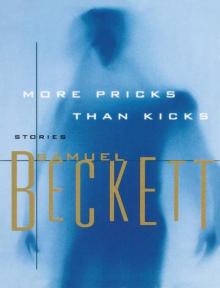 More Pricks Than Kicks
More Pricks Than Kicks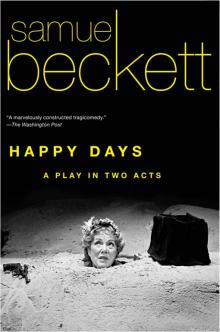 Happy Days
Happy Days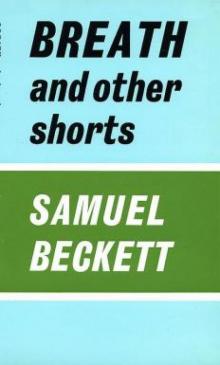 Breath, and Other Shorts
Breath, and Other Shorts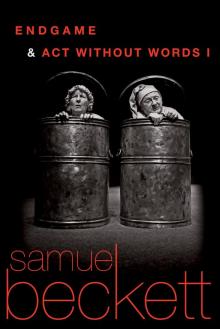 Endgame & Act Without Words
Endgame & Act Without Words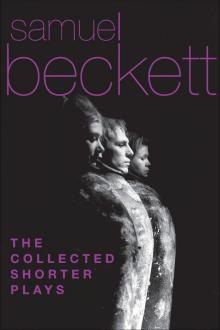 The Collected Shorter Plays of Samuel Beckett
The Collected Shorter Plays of Samuel Beckett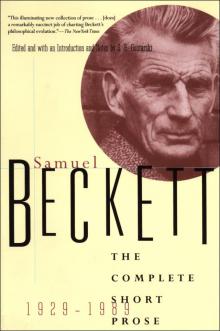 The Complete Short Prose, 1929-1989
The Complete Short Prose, 1929-1989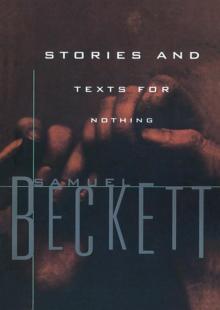 Stories and Texts for Nothing
Stories and Texts for Nothing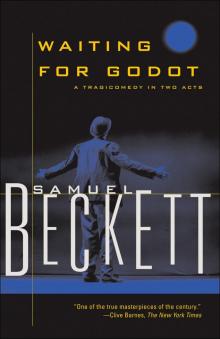 Waiting for Godot
Waiting for Godot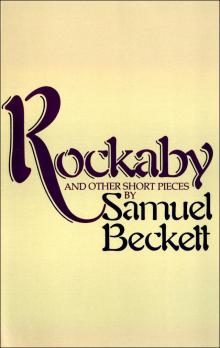 Rockaby and Other Short Pieces
Rockaby and Other Short Pieces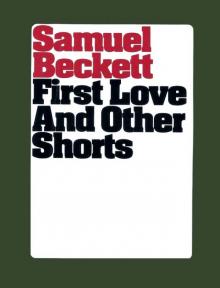 First Love and Other Shorts
First Love and Other Shorts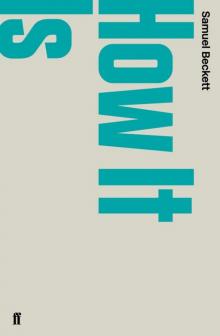 How It Is
How It Is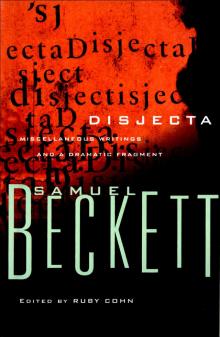 Disjecta: Miscellaneous Writings and a Dramatic Fragment
Disjecta: Miscellaneous Writings and a Dramatic Fragment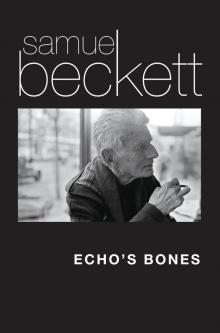 Echo's Bones
Echo's Bones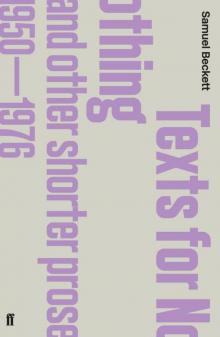 Texts for Nothing and Other Shorter Prose 1950-1976
Texts for Nothing and Other Shorter Prose 1950-1976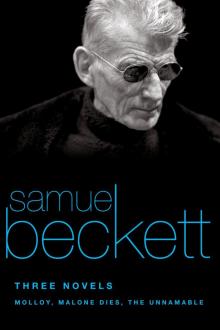 Three Novels
Three Novels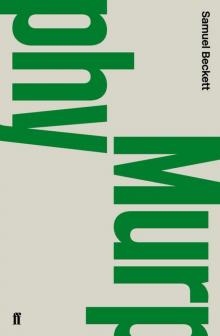 Murphy
Murphy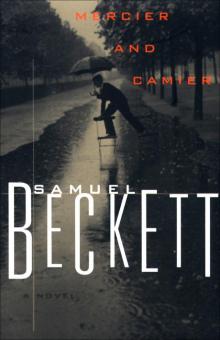 Mercier and Camier
Mercier and Camier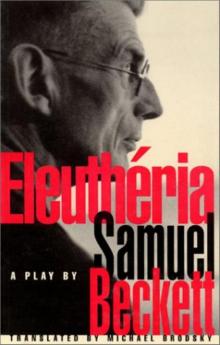 Eleuthéria
Eleuthéria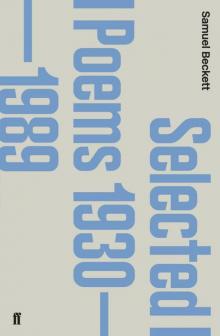 Selected Poems 1930-1988
Selected Poems 1930-1988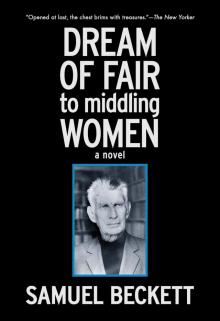 Dream of Fair to Middling Women
Dream of Fair to Middling Women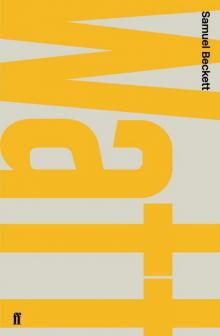 Watt
Watt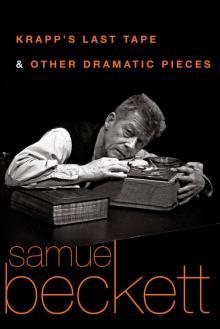 Krapp's Last Tape and Other Dramatic Pieces
Krapp's Last Tape and Other Dramatic Pieces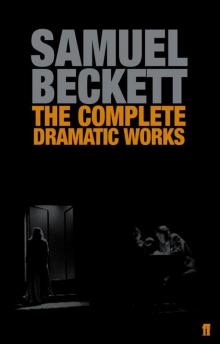 The Complete Dramatic Works of Samuel Beckett
The Complete Dramatic Works of Samuel Beckett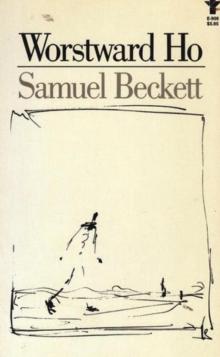 Worstward Ho
Worstward Ho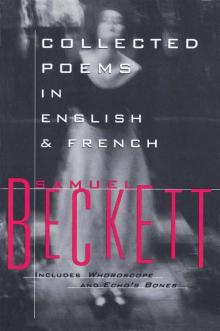 Collected Poems in English and French
Collected Poems in English and French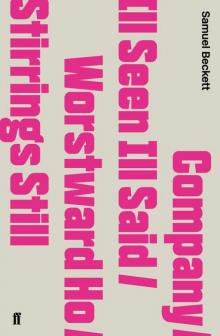 Company / Ill Seen Ill Said / Worstward Ho / Stirrings Still
Company / Ill Seen Ill Said / Worstward Ho / Stirrings Still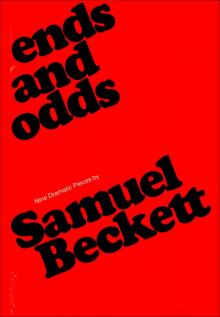 Ends and Odds
Ends and Odds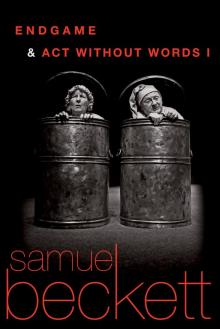 Endgame Act Without Words I
Endgame Act Without Words I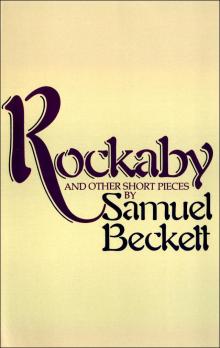 Rockabye and Other Short Pieces
Rockabye and Other Short Pieces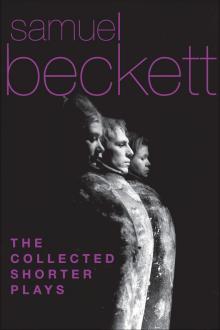 The Collected Shorter Plays
The Collected Shorter Plays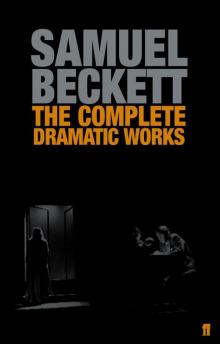 The Complete Dramatic Works
The Complete Dramatic Works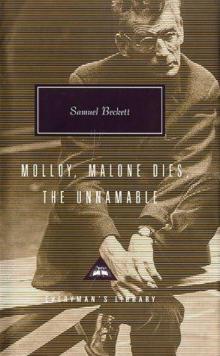 Three Novels: Malloy, Malone Dies, The Unnamable
Three Novels: Malloy, Malone Dies, The Unnamable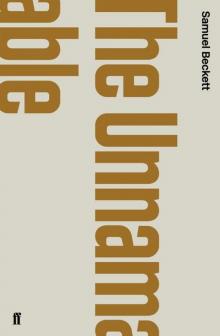 The Unnamable
The Unnamable